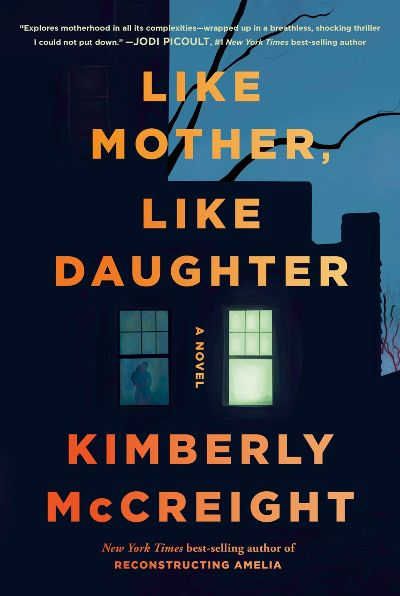Cordelia Black’s successful, not-always-above-board career in pharmaceutical sales enables some of her passions in life: buying super-expensive designer clothes and drugging bad men so that she can get them to her secret killing room. That terrifying shadow world is never meant to be revealed to those Cordelia loves most: her best friend, Diane, and Diane’s daughter, snarky but loveable pre-teen Samantha (don’t call her Sammy). But Cordelia and Diane’s funny/tragic dating lives mean that her worlds collide, after which everything–everything–goes wrong in a Murphy’s Law-meets-murder nailbiter. It’s all too believable, making this gripping debut one that you’ll tear through. If you’re thinking of Dexter, you’re right–it does have parallels to that great show, though it has a much better ending and more side characters to root for. Another plus: it’s set in Baton Rouge, less often a setting than big sister NOLA. Get this on your TBR pile!
Women
Relatives: you never know what they might be up to. Until you read the will. For Nina—whose beloved father recently died—it’s the discovery of a lavish home in the British Virgin Islands that he left her. Her father was a civil engineer and the home he created—where did he get the money?—is modern and marble, cool and glass. But there’s something a bit off about the house, which slowly begins to come alive. Like some massive escape room, it engages Nina in a game that starts playful but soon becomes terrifying. Then there’s the concurrent story of Maria, a former medical student who now works as a nanny for the immensely rich. She’s able to sock away thousands of dollars while living in gorgeous resort-like mansions. But at her most recent job, the children never show up; in fact, days go by and no one appears, just an electrician to fix a malfunction in the system. The only rule? Don’t enter a room in the basement, which Maria, naturally—after days of boredom—can’t help but do, setting off a life or death struggle that spreads over days. Steadman gets a 10 for creating a puzzle/pawn like novel of terror that starts fast, only to gain even more speed as the reader inevitably rips through the short, action-packed chapters. Prepare yourself for something very new and very disturbing.
A richly depicted, absolutely haunting, and totally compelling novel from the consummate historical crime novelist Rhys Bowen. It’s 1968, and Liz Houghton is writing obituaries when she really wants to be a reporter. The disappearance of a young girl prompts her to go rogue and take on the investigation—with help from her roommate, Marisa, a police detective. Liz finds echoes of 1968 in the disappearance of three girls during World War II, lost while being evacuated to avoid the bombings. She eventually discovers the village of Tydeham, abandoned since it was taken over by the military during the War. Mysteriously drawn to the village—and with the help of a young man she meets there—Liz begins to make connections between what happened in the past and what lives on in the present. Parentage, great country estates, elderly and vulnerable parents, romance, and young women elbowing their way into the professions are all part of the tale. Perfect for book groups, purchase extra copies.
Things couldn’t get much worse for Ellery. She’s all alone at a super-expensive resort in Big Sur where she and her husband were meant to celebrate their twentieth anniversary, except his mid-life crisis blossomed into a full blown decision to divorce (new girlfriend and motorcycle), and, well, the reservations aren’t refundable. Then it turns out that most of the other guests are there to celebrate a wedding. How annoying is that? Ellery misses her kids terribly. And when she decides to take an evening dip in the infinity pool, she finds the groom beat her to it, except he’s floating face down, fully dressed, with a huge gash in the back of his head. Time to call the cops, but a huge storm has moved through, triggering a mudslide that completely isolates the hotel, cutting off cell service. Yup, we are in a closed-resort novel. But, fortunately for Ellery, she makes some friends, and together they set out to investigate what’s really going on in this Christie-like setting. This is Condie’s adult debut (she is author of the YA “Matched” series) and she does a magnificent job of balancing the search for a murderer with exploring Ellery’s rich internal life. A gift to readers who enjoy closed environments and unsettling outcomes.
If you like a jaw-dropping twist, this is the book for you, and I mean the reaction literally: at one point in this great domestic drama, one character whispers a closing remark to another that literally made my mouth hang open. And that wasn’t the last surprise. The drama concerns a missing child, Laika Martenwood, whose English family’s treatment by the media after she’s gone will remind readers of the real-life McCann family, dragged through the tabloids after their daughter was snatched. The Martenwoods are more dysfunctional than even the tabloids say, though. The father is one of the most loathsome characters to come along in a while; his wife is so psychologically abused that she can’t leave and can’t protect her children from him; and daughters Willa and Laika are relentlessly mocked and bullied by the horrible man. As the book opens, we find Willa as an adult, barely hanging onto the life she’s cobbled together while agonizing over whether her sister is still alive, where she could be, and what happened to her all those years ago. Moving back and forth in time, Collins puts the media and family ties under a magnifying glass, in the process reminding readers that just as things don’t break on their own, they don’t have to stay broken.
Cleo, a student at NYU, has a tumultuous relationship with her mother, and that hatred gets tested in McCreight’s latest domestic thriller. Cleo’s mom, Kat, begs her to come for dinner, and Cleo reluctantly agrees. Arriving late, she finds food burning in the oven and on the stovetop and blood on a shoe, but no Kat. What happened to her mom? As she searches for answers from her father and friends, she quickly learns that everyone has secrets, and the mom she wanted to avoid was not the woman she thought. The story jumps between Cleo trying to find the truth and Kat, from two weeks before her disappearance, trying desperately to hide from her past and keep Cleo from discovering everything. Even the most jaded readers will not anticipate all the surprises here. McCreight, who knows how to keep the pages turning, has become one of the best in the psychological thriller genre. She has another bestseller on her hands.
Do you love books that take you to new places, especially if it’s unlikely you will ever visit them in person? Me too. And Downes’s thriller does exactly that, bringing us to the dramatic coastal highways of Western Australia and setting us down among the “vanlifers,” who are exploring the coast while living out of their souped-up vehicles. But this isn’t a Fodor’s Travel Guide. We’re following Katy Sweeney, who’s hit the road in hopes of finding her sister, Phoebe, a sort of solo travel influencer, who disappeared a year ago. The case has grown cold and the cops have all but given up when Katy meets Beth, another young woman who has her own reasons for disappearing into the anonymous van world, a world often hostile to women. The two pair up—Beth is pretty destitute—and use Phoebe’s social-media posts to retrace her steps along the coast. Documenting a true road trip from hell, this fast-moving suspense novel eventually arrives at a resolution that is both terrifying and shocking, turning everything we have come to believe inside out and upside down.
A delightful satire—fun, fast, and furious—of the high-flying tech industry. Every year adtech start-up Aurora brings together its top executives for a weekend retreat (think PowerPoint presentations and Jet Skis), this year, it’s in Miami Beach. It’s quite a cast of characters: for starters, the CEO models himself on Churchill. In the hands of other novelists, the cast could become a messy menagerie. But each character here is so well-defined, beginning with the company’s latest hire, Caitlin Levy, Head of Events (curious since Aurora has never sponsored an event). But just when the second day has started and everyone is beginning to sober up, there’s the announcement that the company has been sold, and suddenly everyone is if not very, very rich, then quite rich. It would be time to celebrate, except that one of the high-level executives has disappeared. And the entire retreat is under surveillance by the tech media, who can sniff a good story. Like Rosenblum’s first novel, Bad Summer People, this novel delights in exploring what lies under the surface. The adtech folks would call that a deep dive.
Lapena’s psychological thrillers never disappoint. In her latest, set in Fairhill, Vermont, a farmer investigating vultures over his field finds the dead body of a young woman. This kind of thing never happens in Fairhill, and when the horrified local police realize that the victim is a local teen, Diana Brewer, the town reels in shock and grief. “Trying to make sense of something that will never, ever make sense” are Diana’s bereft single mother, who worries others by telling them she still communicates with her daughter, and the young woman’s best friends, Riley and Kelly, who are determined to find the killer. But even in a small town, it’s not easy to figure out who could have done this awful thing, and readers will enjoy sleuthing along with the characters as suspects emerge, each with something dark to hide. Supernatural elements enter in several ways here, adding to the edginess and puzzlement. If you like Chris Bohjalian, this one’s for you, not just because of the Vermont setting but also the small-town drama.
In many ways, Kingston and Jasmyne Williams are living their dream life. Their little boy, Kamau, is thriving. They have another baby on the way. And Kingston, or King, is making oodles of money in finance. But King is eager for a next step: moving them to Liberty, a controversial suburban Los Angeles community of very, very rich Black people that comes with all the trappings. A sumptuous spa—sorry, wellness center. Lavish homes with three living rooms each (one for everyday, one for company, and a den, of course). And an excellent school for Kamau where every teacher is Black and they won’t have to worry about him fitting in. From the moment she reluctantly agrees to this transformation of their lives, Jasmyn is nervous about abandoning her community and her belief in giving other Black people a hand up. And she’s right: Liberty turns out to be one sinister place, in ways readers will never guess and that will keep them on edge right up to the last gasp of surprise. Yoon’s first adult novel has some of the hallmarks of her YA background: a character who feels like it’s her against the world, a shifting sense of who can be trusted, and a feeling of not fitting in. This will be a great crossunder read for young adults as well as a hit with fans of Zakiya Dalila Harris’s The Other Black Girl.










